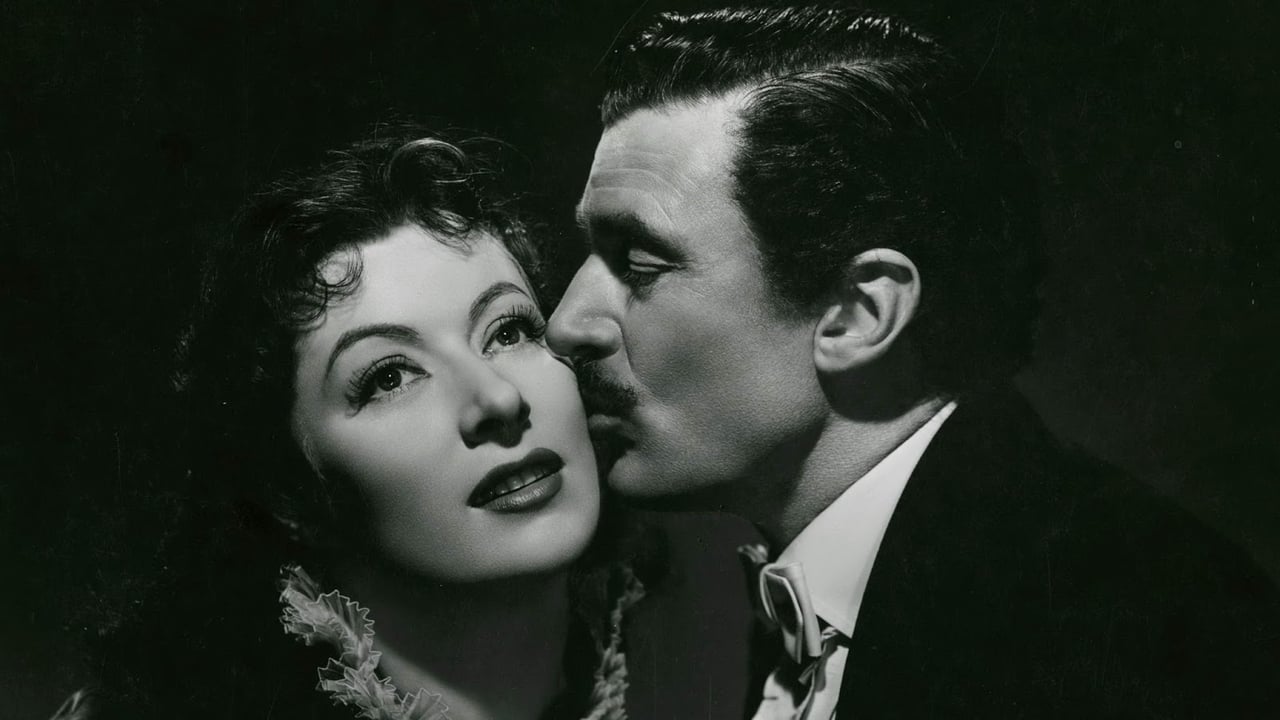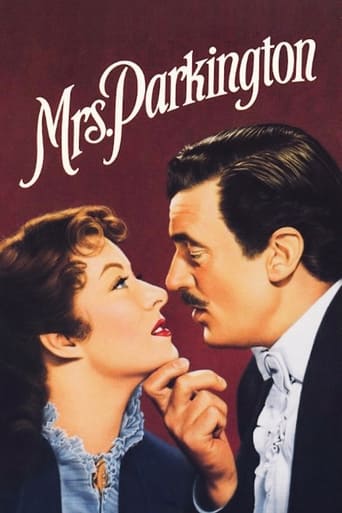

Tay Garnett's resplendent black-and-white MS. PARKINGTON represents one of eight Garson-Pidgeon star-vehicles, it is a vintage family saga of our titular heroine Susie Parkington (Garson), a rich matron starts with a humble beginning as a chambermaid, when a mine explosion takes her mother's life away, out of guilt and admiration, Major Augustus Tarkington (Pidgeon) marries her and spirits her away to New York, so she can get a luxurious life a woman can ever dream of. She gets some advice to adopt the lifestyle of beau monde from a French aristocrat Baroness Aspasia Conti (Moorehead), who is also Major's confidant. And a new but tumultuous page of life opens and Susie gives her best shot to manage a perfect marriage with a dignitary and grows up to be an exemplar who knows and accomplishes a woman's true worth, heightened by a dramatic presentation of an inopportune situation when most of their dinner guests are in absentia for their fancy reception and bookended by a vignette in London involves Edward, Prince of Wales (Kellaway). These mentioned above actually are told through flashbacks by Susie, when she is an octogenarian and Augustus has long gone, during a Christmas gathering, she learns that her favourite great granddaughter Jane (Rafferty) decides to elope with a former employee of her father Amory (Arnold), and later finds out Amory is going to prison for fraud if he cannot pay a loan worth $31 million, which is equivalent to the entire inheritance for her offspring. It is drastically ironic that her progeny are abominable snobs (save Jane), since Susie is an excellent woman in all respects, but still, bad parenting cannot be dodged, through Gladys Cooper's portrait of her daughter Alice, a sheer ne'er-do-well and pain-in-the-neck. Or could it be a telling proof that the second/third-generation rich are really past hopes for integrity and humility? Since the film bifurcates into two alternate narratives with a time-span of over 60 years, it presents Garson a full-scale chance to act from adolescence to senility, although she is consistently pleasant to watch and impressively dignified in the latter period, her rigid posture can never pass off as a woman in her eighties no matter how much effort exerted from the make-up division. Yet, audience can easily side with her character because of what she represents - a wife with a perfect sense of propriety and a woman with sublime wisdom. As the film's title infers, co-star Pidgeon dutifully retreats to a second tier and downplays Major's volatility and vainglory.Garson is nominated with an Oscar and so is Ms. Moorehead, probably in her most opulent attire, her Aspasia is even much more laudable in handling the delicate issues of the rivalry among women or in a more literal sentence, how to co-exist with the wife of the man you love without hating each other's guts. Kellaway, Arnold and Birell (who plays Lady Nora Ebbsworth, a good sport in playing hostess) are all fittingly memorable, Garnett, a steady hand in orchestrating a character-driven centerpiece with grandeur and style, and so is Bronislau Kaper's mellow escorting score for a two-hour chronicle in the bygone era.
... View MoreThis B&W film from 1944 stars Greer Garson and Walter Pidgeon, who were riding a wave of success together at the time. MGM threw all of their best production and talent at this film and it shows on screen. The sets are fantastic, the cinematography is beautiful, the music is lush. But I felt disappointed with the final product.The story starts during the Christmas holiday in 1938. The members of the Parkington family are assembling in the grand house of their mater familia, Susie (Garson). As they wait for Susie to descend the stair and honor them with her presence, they spread their flawed character traits (and dissatisfaction with the world) around the drawing room.You may have met a woman like Susie--one whose very existence is a memorial to the memory of her deceased husband, Major Augustus Parkington (Walter Pidgeon). This woman usually refers to her man as "The Major" or "Mister So And So". And inevitably, the man whose life she celebrates even in death was a real bastard, or at least someone very terribly flawed, making her love for him (supposedly) more heroic, more saintly. There is something to that. Gus was a man dedicated to Susie in his own way. And his love for her was not in compliance with society's rules. But he never bowed to the will of society.Later that night, Jane--the missing granddaughter--drops by to see Susie. She explains that she is leaving for Peru with a young man. This sparks the first of many flashbacks in the film. Back fifty-five years to Leaping Rock, Nevada--a small town built around a silver mine. Susie was only eighteen when she met Gus, owner of the mine.Up to this point in the film, I was enjoying its exposition. But somewhere after Leaping Rock the action slowed to a plodding pace. And the deficiencies in the script and the acting became apparent. Some of the words that come from the lips of the primary couple are inauthentic--at least as delivered. There is a scene where Susie confronts Gus upon realizing he has been working to destroy some men who dared to decline a dinner invitation. Here the acting is truly horrible. And it shows how an inauthentic moment can drag down a film.Maybe it's just me, but I found the incessant use of "I'll Take You Home Again, Kathleen" in the background monotonous and annoying.Agnes Moorehead is wonderful as the Baroness Aspasia Conti, the woman who bridged the gap between Susie and Gus and helped them stay together. Hans Conreid is enjoyable in a smaller role as Mr. Ernst, the manager of a temperamental tenor.With all the talent involved, this film should have been better.
... View MoreGreer Garson and Walter Pigeon were one of the great romantic teams of the 1940s but both were too old (particularly Pigeon) for their roles in this disappointing film version of the popular Louis Bromfield novel. Pigeon is simply miscast; he is too much the gentleman to ever be convincing as the boorish, philandering Major "Gus" Parkington. As his wife, Susie, Garson, wearing a dark wig (and looking rather like Yvonne DeCarlo), ages from a naive young woman to the crusty, 84 year old family matriarch. The characterization is never believable but her scenes as the elderly Mrs. Parkington are especially objectionable (she's too arch). Neither Garson or Pigeon is particularly well-aided by a meandering script that fails to adequately clarify the relationships among the family members or takes the time to develop the various characters. Consequently, one simply doesn't care what happens to the members of the Parkington dynasty. The supporting cast...among them, Edward Arnold, Lee Patrick, Dan Duryea, Cecil Kellaway, Frances Rafferty and Tom Drake...is competent but only Agnes Moorehead, in a rare sympathetic turn as Pigeon's ex-mistress, and Gladys Cooper, as Pigeon and Garson's dypsomaniacal daughter, manage to make a significant impression.
... View MoreThis alakin movie to the Little Foxes studies a family that is essentially no-good, a bunch of mama's boy's that have never toiled for anything in their lives and are thus extremely ungrateful and selfish. Garson wearing a wig and old Hollywood stars as the matriach of this American dynasty. The plot is jump-started as the family daughter intends to get married but there is a secret which her beau has and intends to tell. This ingot might just kill their chance for marriage and happiness. As it involves financial ruin, it causes an assemblage of the remaining members of this family. Here the flashbacks begin that tells the story of the dead Patriach and the matriarch of this family, how they met at an old dingy coal town, their marriage, pits and falls and always in all these scenes Garson luminence is assured. It is said that the writer of the book so loved this adaptation and told the director Tay garnett so. But one can't avoid the fact, that in my post-TV movie of the week eyes, this movie would have made a good mini-series in the eighties. And it feels it. The ending is a good old smacking of American entreprenial values and greed. I particularly remember a scene where Walter Pidgeon promises to crush everybody who refused to show up for a dinner party. It feels like a scene out Of Kane and Abel, a book that was turned into a well-received mini-series in the eighties. Like I said, that's what it is.
... View More